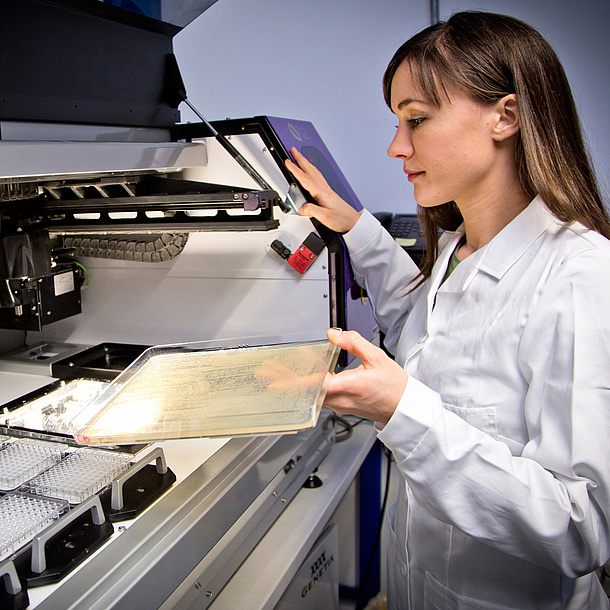Quick Facts
- Duration of study: 4 semesters
- ECTS credit points: 120
- Academic degree: Master of Science (MSc)
- Language of instruction: German
The Master's Programme
In the Master's degree programme in Molecular Microbiology, you will expand your knowledge in relevant research areas such as genetics and infection biology. You will put cell ageing and metabolic processes under the microscope, examining these processes at the molecular level using model organisms. How bacterial diseases develop, how cells become resistant (i.e. pathogenicity and resistance) and the role of the microbiome are subjects that are addressed intensively in this programme.
Research-led teaching occupies a central position in the degree programme. In state-of-the-art laboratories, you will learn how to independently use the latest equipment and apply current research methods. Additional emphasis is placed on learning analytical methods and both presenting and critically interpreting scientific data.
In the 3rd semester, you will devote much of your time to laboratory work. In the 4th semester, you will write your master's thesis. The programme has an international orientation, and numerous courses are held in English.
Focus Areas
The programme is divided into four compulsory modules and one elective module. In the compulsory modules, you focus strongly on the theoretical and practical aspects of basic research in the field. In the elective module, you choose an individual area of specialization and deepen your knowledge in specific areas. The four compulsory modules are:
- Microbiology and Infection Biology – including the subjects: bacteriology and bacterial genetics, biodiversity and applied microbiology and infection biology
- Molecular Cell Biology and Genetics - including the subjects: yeast genetics and yeast cell biology, gene regulation, molecular and cellular mechanisms of age-associated diseases.
- Systems Biology and Bioinformatics - including the subjects: bioinformatics and biostatistics
- Research Molecular Microbiology – In this module, a focus is placed on laboratory work and the analysis and discussion of research results.
The subjects of the elective modules are:
- Microbiology and Infection Biology: immunobiology, biotechnology, electron microscopy, and several related subjects.
- Molecular Cell Biology and Genetics: aging and apoptosis, cell biology of yeast, imaging techniques, and several related subjects.
- General Elective Module: presentation & science communication
Research
In the Master's degree programme in Molecular Microbiology, you have excellent opportunities to learn more about current research. The programme offers numerous laboratory exercises to highlight the practical relevance of the field.
In these exercises, you will learn how to use current methods, such as electron microscopy, mass spectrometry and flow cytometry, providing you with a competitive edge and expertise that will help you in your future career.
Admission
1. Admission Procedure
Graduates of the NAWI Graz Bachelor’s Degree Programme in Molecular Biology are admitted without needing to fulfil further conditions.
Graduates of other prerequisite degree programmes are encouraged to refer to the curriculum (in German) to see if they are eligible for admission with or without fulfilling further requirements.
Graduates of other bachelor's degree programmes can obtain information and apply for admission by contacting study@tugraz.at.
2. Admission
- Admission and deadlines for Austrian students who are beginning their studies at TU Graz for the first time
- Admission and deadlines for international students
- If you are or were already admitted to a degree programme at TU Graz, please come to the TU Graz Registrar’s Office in person during the admission period or contact study@tugraz.at.
Fragen zur Zulassung?
Contact study@tugraz.at
Career Prospects
Professional Fields
Graduates from the Master’s degree programme in Molecular Microbiology are able to carry out independent research in the fields of molecular microbiology and infection biology as well as in molecular cell biology and genetics.
Graduates are usually employed in leading positions in basic or applied research, but also in production and quality control.
Common employers include businesses and institutions in the following fields, among others:
- Medical and pharmaceutical research
- Environmental analysis
- The medical-diagnostic area
- Agricultural research
Attractive career prospects also arise in industry, but also in university and non-university research institutions, as well as in public authorities and other public institutions.
Acquire AI skills: AIE Extension Programme
Increase your career prospects with the Artificial Intelligence Engineering (AIE) extension programme and learn essential skills in AI development and application during or after completing your Master's degree.



